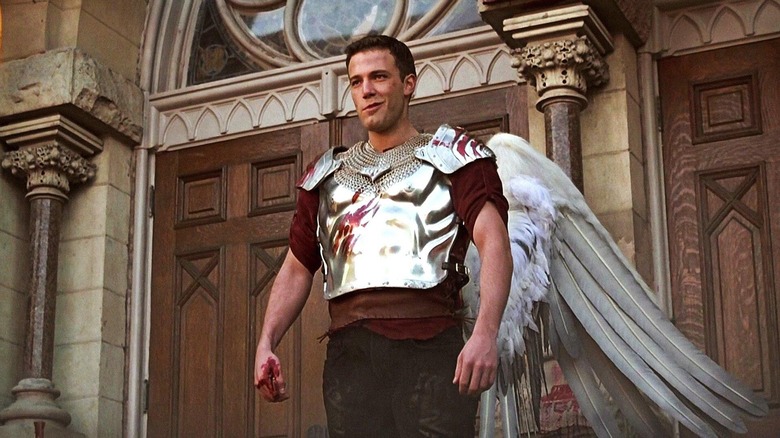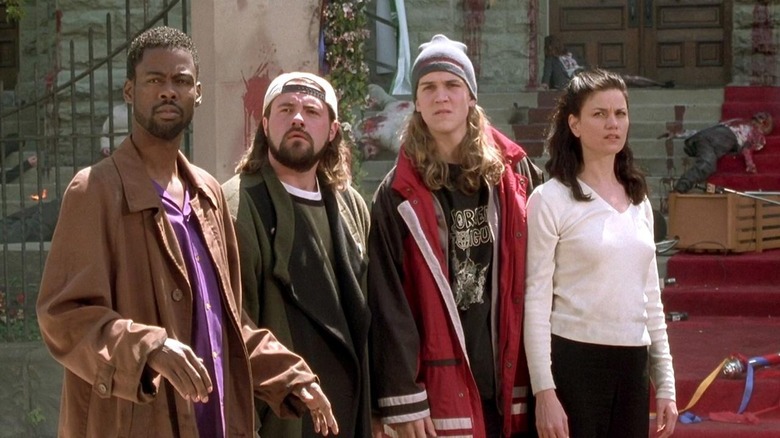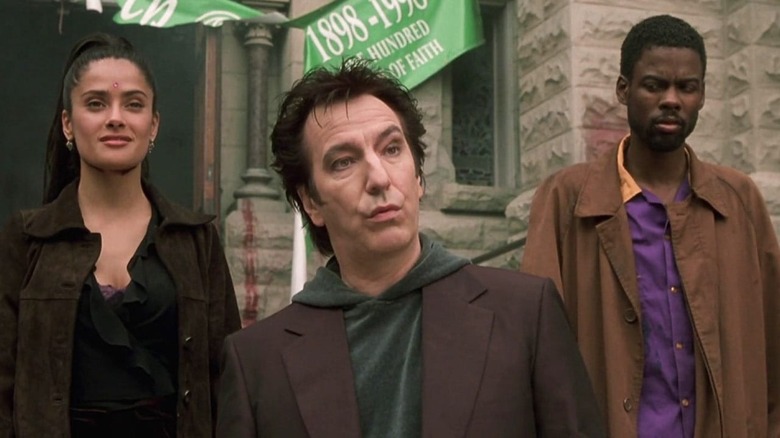Here's Why You Can't Stream Or Buy Dogma, According To Kevin Smith
They say you never forget your first Kevin Smith movie, and for a lot of people, that film is 1999's "Dogma." While Smith broke onto the scene with indie darlings like "Clerks," "Mallrats," and "Chasing Amy," his religious satire came after the success of "Good Will Hunting," which helped break View Askewniverse favorite Ben Affleck and his collaborative partner Matt Damon into a whole new category of fame and acclaim. Adding stars like Chris Rock, Salma Hayek, and Alan Rickman to the cast only piqued audience interest even more, as did the controversy that surrounded such a "blasphemous" film. Many consider "Dogma" to be one of Smith's strongest entries in his filmography (this writer included), but younger generations have been unable to easily access the film, which has become ridiculously difficult to track down.
As of publication, "Dogma" is unavailable to stream (legally) on any platform, and unused, out-of-print physical copies will cost a pretty penny. Sure, you can run the risk of buying a used DVD or bust out the VCR and hope the VHS tape you snagged on eBay hasn't warped after all these years, but it seems ridiculous that one of the best films from one of the most easily identifiable directors in the industry can only be viewed after going on a "Jay & Silent Bob"-style mission.
Thanks to an interview with Smith over at The Wrap, he's finally confirmed all of our suspicions as to why "Dogma" has all but disappeared: It's because Harvey Weinstein is not only the human equivalent of the dead skin shavings from a foot heel file, but also because he was straight-up bad at his job.
The rights issues
As Smith tells it, former Disney CEO Michael Eisner had told Weinstein not to make "Dogma," knowing that the controversial script was going to upset the Catholic community. (And boy did it!) The company was just recovering from China threatening to end their business relationship with The House of Mouse after Scorsese's "Kundun," so it's understandable why Eisner was on edge. Still, the production moved forward, with Eisner suggesting to Weinstein that he sell off the film after it was completed, similarly to the way Weinstein had released Harmony Korine's "Kids" through a short-lived company called Shining Excalibur Films. Smith says that Weinstein pursued "Dogma" with the knowledge he could opt for that same type of releasing deal if push came to shove, "and since Disney paid for it whether or not [Weinstein] had to pay them back, it would behoove him to make the movie and deal with the consequences later on."
"Dogma" became a huge theatrical release for Lionsgate, and became the company's biggest hit at the time. Columbia/TriStar acquired the home video rights for a small period of time, and put out the DVD and Blu-ray that so many film fans hold dear in their collections. Unfortunately, the rights lapsed and reverted back to The Weinstein Company, who by then were moving into a different creative direction. "They were rebuilding and doing the almost Miramax version of the Weinstein Company without us, and I think we were complete afterthought," Smith said. "I mean, honestly, not even a thought. I don't think he realized that he still owned that movie."
The phone call
Around 2017, Smith hadn't worked with Miramax for almost a decade, but Weinstein called to see if Smith wanted to do anything with "Dogma." Smith was absolutely delighted, because it seemed like a continuation of "Dogma" was finally going to happen. "All the people that were in it are still around, so we can make a pretty good sequel or series even better," Smith said. "After a decade he remembered that I was part of the Miramax family, and he remembered that he had 'Dogma' and had a cool cast and I don't know, I felt like wow, that's, that's cool."
A week later, The New York Times story about Weinstein's history of abuse and harassment broke. Smith told The Wrap that reading the news made him sick. "Rapists don't openly act out in public. That's something that you keep hidden," Smith said. "We knew that the guy cheated on his wife, that was always the big rumor, but we didn't know anything about this s***." Given the excitement he had the week before after that phone call, he said that he was feeling "guilt by association."
To make matters even sicker, Smith later learned from former MIramax executive John Gordon that the reason Weinstein called in the first place was because he was trying to figure out who had spoken with The New York Times, knowing the piece was coming to light. "I was like, 'That makes perfect sense.' I'm guileless, I don't see all the angles," Smith said. "He was calling not because he wanted to do anything with 'Dogma.' He wanted to see if I was one of the people who had spoken to The New York Times. I hadn't, because I didn't know any of that stuff."
The future of Dogma
When Weinstein's life was correctly imploding, Smith got wind that he was trying to sell off the rights to the film for $5 million and that he was claiming the director would be involved with a new release, but Smith wasn't having it. "Please tell that company that I'll have nothing to do with it, if he's still attached to it," he said. "I'll work on a 'Dogma' anything, as long as he has no more ties to it." Smith and his legal team even contemplated buying the film back themselves, which put them in an impossible situation because doing so would mean giving money to that rotten egg sandwich of a human.
"He's holding it hostage," Smith told The Wrap. "My movie about angels is owned by the devil himself and if there's only one way out of this, maybe we could buy it away." Unfortunately, Weinstein scoffed at his offer and refused the sale. Smith learned a few months ago that "a new company" now has the rights to the film, but he believes it's still the same company with a new name to try and distance itself from the controversy. "The right thing to do would have been to sell it back to me even if you didn't want to sell for the price that I first said," Smith said. "Tell us what that price is and sell me my self-expression back."
If anyone in entertainment legislation is reading this, perhaps an industry standard "Dogma" clause should be proposed regarding rights to projects to prevent something like this from happening ever again.



